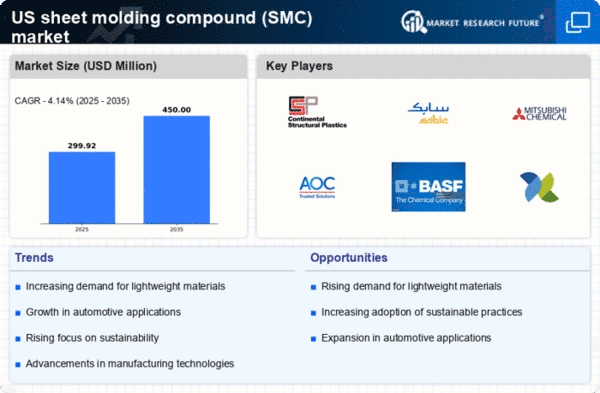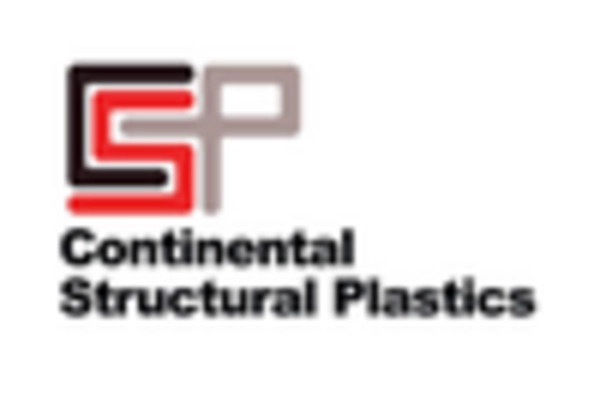The sheet molding-compound-smc market is characterized by a dynamic competitive landscape, driven by innovation, sustainability, and strategic partnerships. Key players such as Continental Structural Plastics (US), SABIC (SA), and Hexion Inc. (US) are actively shaping the market through their distinct operational focuses. Continental Structural Plastics (US) emphasizes innovation in lightweight materials, particularly for the automotive sector, while SABIC (SA) is leveraging its extensive research capabilities to enhance product performance and sustainability. Hexion Inc. (US) is focusing on expanding its product portfolio to meet the growing demand for high-performance composites, indicating a collective shift towards advanced material solutions that cater to evolving industry needs.The market structure appears moderately fragmented, with several players vying for market share through localized manufacturing and supply chain optimization. Companies are increasingly localizing their production facilities to reduce lead times and enhance responsiveness to customer demands. This strategy not only improves operational efficiency but also strengthens their competitive positioning in a market that is becoming increasingly reliant on quick turnaround times and customized solutions.
In September Continental Structural Plastics (US) announced a partnership with a leading automotive manufacturer to develop advanced composite materials aimed at reducing vehicle weight and enhancing fuel efficiency. This collaboration underscores the growing trend towards lightweighting in the automotive industry, which is crucial for meeting stringent emissions regulations. The strategic importance of this partnership lies in its potential to position Continental as a leader in sustainable automotive solutions, thereby enhancing its market share.
In October SABIC (SA) launched a new line of eco-friendly SMC products designed to meet the increasing demand for sustainable materials in various applications. This initiative reflects SABIC's commitment to sustainability and innovation, aligning with global trends towards environmentally responsible manufacturing. The introduction of these products is likely to attract a broader customer base, particularly among companies prioritizing sustainability in their supply chains.
In August Hexion Inc. (US) expanded its production capacity for SMC materials in response to rising demand from the construction and automotive sectors. This strategic move not only enhances Hexion's ability to meet customer needs but also positions the company to capitalize on the anticipated growth in these industries. By increasing production capacity, Hexion is likely to strengthen its competitive edge and improve its market presence.
As of November the competitive trends in the sheet molding-compound-smc market are increasingly defined by digitalization, sustainability, and the integration of advanced technologies such as AI. Strategic alliances are becoming more prevalent, as companies recognize the need to collaborate to enhance innovation and operational efficiency. The competitive differentiation is expected to evolve from traditional price-based competition towards a focus on technological advancements, sustainable practices, and reliable supply chains. This shift indicates a transformative phase in the market, where companies that prioritize innovation and sustainability are likely to emerge as leaders.
















